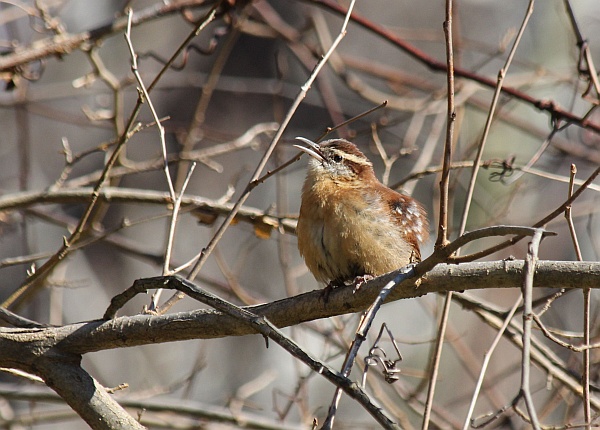
Speaking of First Bird of the Year, who’s the first bird to sing in your neighborhood? Have you heard any singing yet?
In Pittsburgh most birds stop singing in mid summer, though a few late-nesting residents keep it up until autumn. They’ve been silent for months now.
A few hardy souls sing in January. The First Singer in my backyard is usually a Carolina wren who pipes up just before dawn. On a good morning his voice echoes off the hills and prompts competing wrens to respond.
… But this is not a good morning. We have freezing rain today. 🙁
Even on a good day he’s silent within 15 minutes. I’ll know it’s spring when he sings all day.
(photo by Gregory Diskin)
I’m listening to the crows call to each other this morning. Guess they are discussing how the freezing rain will affect their plans.
🙂
I heard a couple Carolina Wrens too, calling to each other at Boyce-Mayview park late on the 1st, and I actually saw one rooting around in the brambles. I always enjoy finding wrens…
Kate–as a novice feeder of birds, I’ve been wondering why they arrive in waves during the day at my patio. All of them together: blue jays, woodpeckers, chickadees, cardinals. Swooping in; taking turns at the feeder and suet basket; then they’re gone for a few hours. Do they keep an eye on each other and follow “the leaders” to the food? On a side note, a few days ago we had about two dozen robins who were just passing through! I do have someone who is singing but haven’t identified him yet.
Liz, in the winter the birds stay in flocks for protection. A lone bird would likely become a meal for a watchful hawk. Sometimes a hawk stakes out a feeder area and waits for a small bird to make a mistake. When he leaves, the small birds all swoop in at once.
Birds also go through active/rest cycles. They are most active after dawn (“breakfast”) and before sunset (“dinner”). The worst time to find songbirds is usually about 1:00 to 2:30pm when they’re all taking a nap. Of course this varies based on the weather … and whether they had to wait for the hawk to leave.
Mockingbird
Thanks, Kate. That makes sense. I had never considered that a flock would be a mix of birds. They are very inclusive!
My carolina wren sings at the top of his lungs when the hawks are around. I swear he’s the lookout.. and he’s never hiding from the hawk… either brave or foolish!
Here in the deep south, we hear birds year round, but as you say, they get much quieter in the winter. Right now our feeders are full of sparrows with their usual twittering and chattering. Plus the ever-here doves. And yes, our wrens are very vocal!
I can’t really call it singing, but if I’m not out placing a handful pf peanuts on the porch railing before the crack of dawn, I get an earful from the neighborhood bluejays.
White-throated sparrows this morning.
Yesterday I heard a northern flicker doing a territorial call, which is the first major bird sounds I’ve heard in ages (except for the blue jays and chickadees complaining, as they always do). And today I saw a group of three flickers sitting at the top of one of our trees, in the rain.
We have no interesting birds this year, since the weather has been so mild. No tree sparrows or white-throated sparrows, like we had last year. Just chickadees, titmice, nuthatches, blue jays, and wrens.
Mary Ann, I agree that we haven’t had interesting birds. ‘Bad winter’ often means good birds in southwestern PA. Next week we’ll have our chance at good birds when the weather turns bitterly cold.
Today (Jan 4) the Carolina Wren sang before dawn.
First bird “song” today was a ring-billed gull 🙂